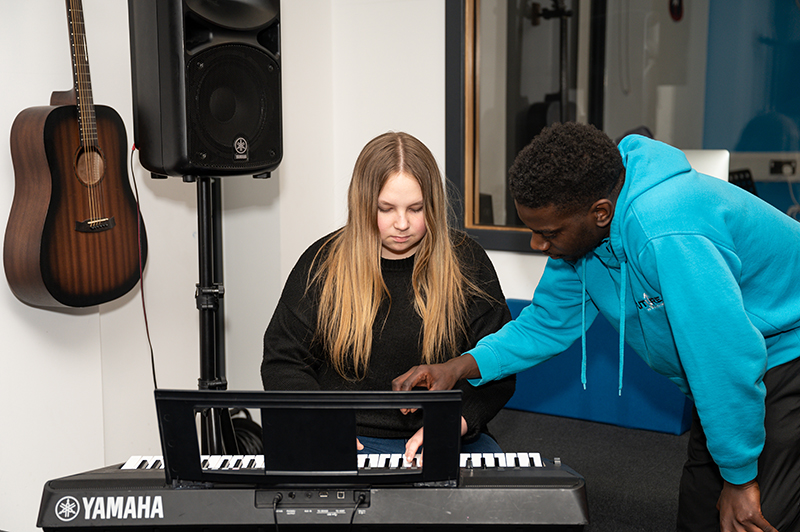London’s young people retreating to their bedrooms post pandemic
- 48% of young people in London spend most of their free time in their bedrooms.
- 19% of London’s young people spend most of their free time alone.
- 39% of young people in London don’t have opportunities to meet new people or make friends.
- Youth clubs help young people make new friends, develop new skills and build resilience.
A major new study into the social lives of children and young people aged 11-18 in England published today by the youth charity OnSide, shows that young people in London are navigating a world outside of school that is increasingly isolated and home-based, with limited opportunities for face-to-face socialising, making new friends or meeting people in person.
Future Youth Zone, which is part of OnSide’s network of 14 Youth Zones, has today reacted to the starting findings, calling on more recognition of the vital role of youth centres to give young people opportunities to socialise, make friends and build the valuable life skills that come with real world interaction
Generation Isolation finds that one in five young people (19%) in England spend most of their free time alone – that’s almost a million young people (988,000) living isolated lives*. In London this is replicated with 19% spending most of their time on their own.
Only 14% in London said that they spent most of their free time in person with their friends. And despite common misconceptions around how young people spend their time, the reality is that 75% spend most of their time at home with 48% spending most of their free time in their bedroom whilst just 1% spend most of their time hanging out on the street.
OnSide’s survey of 5,078 11-to-18 year olds in England published in partnership with YouGov, builds a picture of young people struggling to socialise away from screens with 73% of young people surveyed spending most of their free time on screens (watching streamed content like Netflix/YouTube, gaming, spending time on their phone or watching tv). This is lower in London with 71%.
57% in London say they are watching more streamed content now than before the Covid-19 lockdown; 38% of young people say they are doing more gaming now than before the Covid-19 pandemic; and 33% are watching more TV now. Watching streamed content is the most time-consuming leisure time activity for young people with 24%> spending most of their free time outside school doing this, followed by Using their phones (21%) and Computer games (20%).
Generation Isolation shows that youth clubs like Future Youth Zone play a vital role in enabling young people to build rich social lives, develop skills and build resilience. 86% of young people in London that currently attend a youth centre say it has made a positive difference on their lives and 84% of that same group say it has given them new skills Making new friends is the most
popular reason for young people to attend youth centres with 32% of people who said that youth centres have had a positive difference on their life citing this. Yet the report also highlights the lack of widespread opportunity to gain these benefits, with just 12% of young people surveyed in London currently attending a youth centre.
Future Youth Zone is joining OnSide, which develops Youth Zones in some of the country’s most disadvantaged areas, in calling for every young person to have access to high quality youth centres to help them build rich social connections, achieve their potential and develop into happy, healthy thriving adults.
Future Youth Zone has supported many of the area’s young people to make friends, gain vital youth worker support and to take part in engaging and fun activities.
One such example is Katie she says:
“Before going to Future I was spending time on my own in my bedroom, playing silly games on my phone mostly due to boredom. Quite a few young people I know are doing the same now.
I was shy and I didn’t know myself much. I was going to school and then staying at home. I didn’t have many friends and I didn’t go out a lot with the friends I did have.
I have a great family but my four older siblings have all left home. I felt lonely, and I was quite anti-social. There wasn’t much to do or many places to go for young people where I live before Future opened.
It was really bad in lockdown, I felt so lonely. When the Youth Zone opened again it was amazing to see friendly faces, but I hated that I couldn’t hug or even high five my friends as we had to socially distance. I could not even see my siblings or my nieces.
The Youth Zone has helped me to experience so many new things, it’s helped me to grow so much. I never used to cook but now I love to bake at Future, cinnamon buns are my favourite. I’ve visited other Youth Zones, I took the train to Warrington with another OnSide young leader. Trains are a source of anxiety for me but I felt proud of myself that I made the journey and saw another Youth Zone. I even did a skydive for my 16th birthday and raised £700 for Future. Without Future I would be a lot less confident than I am now, I’m really grateful for all their support.”

Other key Generation Isolation findings for London include:
- 20% of young people do not have opportunities to meet new people or make friends beyond their usual group of friends (by contrast, young people who currently attend youth centres have far greater social connections with 80% of young people in this group saying they have lots of opportunities to make new friends).
- 58% of 11- to 18-year-olds surveyed identified as having high to very high levels of anxiety**
- 20% of young people in London do not have opportunities to take part in sport and physical activity outside of school.
- 26% say they do not have a safe space where they feel belonging.
- 26% don’t feel able to manage their health and wellbeing.
- 28% of young people are reading for enjoyment less now than they did before the pandemic. Activity based trips and days out are also on the decline with 28% of those surveyed saying they do this less now than pre pandemic.
Commenting on the findings, Gershom Clarke, Head of Youth Work at Future Youth Zone, said:
“The young people walking into our youth centre today are less confident to make their own decisions or try new activities and there is clearly a correlation between this and the amount of time they are spending at home alone. Real life interaction is vital so young people gain the confidence to try new things. I have seen a young person go in just 5 weeks from being unable to speak in front of others, to performing at a talent show to an audience of 60 parents, carers and friends. That’s the power of youth centres and support from trusted youth workers and we need many more young people to have these opportunities.”
OnSide Chief Executive Kathryn Morley said:
“Too many young people are living isolated lives, increasingly withdrawing into their bedrooms without the support from trusted adults. While online communication is important and has some benefits, its dominance means young people are missing out on the face-to-face interactions that build social skills, confidence, self-esteem, resilience and empathy. We cannot watch an entire generation of young people sleepwalking into social isolation and not develop the qualities that are necessary for mental wellbeing and that lay the foundations for them to thrive into adulthood. With pupils spending 85% of their lives outside of school, the real world has to be as enticing as the virtual one. Youth centres like Future Youth Zone are key to that, helping young people develop and build rich social lives, in safe spaces designed to support them.”
To read the full Generation Isolation report visit: www.onsideyouthzones.org/generationisolation
